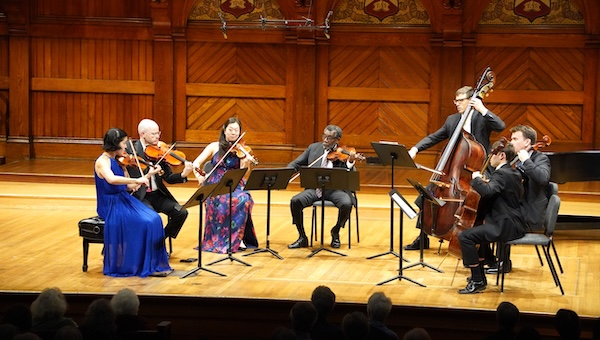Concert Review: The Boston Chamber Music Society Perform Ives, Mendelssohn, and Mozart
By Aaron Keebaugh
The Boston Chamber Music Society’s greatest strengths lay in its skill in letting the music breathe.

Boston Chamber Music Society in action on Sunday night at Sanders Theatre. Photo: courtesy of the artist
He had been raised to break the rules. And that always suited him.
But even Charles Ives realized that his radical experiments with musical quotation, bitonality, and jumbled collages of cross rhythms might never see the light of day. Working as an insurance salesman by day and a composer by night, Ives toiled away for little reward other than the sheer joy of doing so. It took decades for his music to find an audience. And when it did, his advocates declared him America’s most original composer.
Ironically, by the time of his death in 1954, Ives had struck a chord with mid-century modernists by turning his gaze toward the past rather than the future. His most familiar scores may be dissonant on the surface, but they express nostalgia for an ideal America, a country more placid and pure. Leonard Bernstein went so far as to say that Ives’s music betrays a kind of small-town naïveté. Acclaimed pianist Jeremy Denk, however, gives the composer more agency, claiming that Ives “is optimistic but always a mess, always falling apart at the seams. His music suggests America will just have to muddle through, and wrestle with its own failure.” Given that range of admirers, Ives might be a figure for just about any generation.
For the Boston Chamber Music Society, Ives’s music is about entertainment as well as enrichment. Their performance of his Piano Trio at Sanders Theatre this past Sunday dovetailed bravado and intimacy, interweaving showmanship and deep reflection.
Ives composed the score between 1911 and 1914, envisioning it as a young man’s reminiscence of college life. Quotations of “My Old Kentucky Home,” “The Campbells Are Coming,” and “Rock of Ages” grind up against snippets of the Yale fraternity tune “A Band of Brothers in DKE.” These assemblage of quotations never find resolution, at least in the traditional sense. The piano serves as a ballast for the violin and cello, amplifying and nullifying the perpetual tension with off-key harmonies that are felt as much as heard. The truth is, Ives never takes himself too seriously. The (sophomiric?) second movement, TSIAJ (This Scherzo Is a Joke), crushes its disparate elements together with crude — but still gut-busting — hilarity.
The BCMS performed this music with a wild abandon that tipped into the delightfully unhinged. Violinist Jennifer Frautschi and cellist Edward Arron dug into their parts furiously. Rhythms crackled in the scherzo and finale, but the music still swept along. Yet they could slow down to caress the splendors in the quieter passages, embracing the music’s heartfelt sentimentality. In the first movement, Arron’s deep mahogany tone complemented the silvery graces generated by Frautschi’s line. Through it all, pianist Max Levinson played with the devout warmth of a church pianist, his harmonies shimmering in the background.
The BCMS bookended this performance with youthful works by Mendelssohn and Mozart.
Though a product of Mendelssohn’s youth, much like the Octet, the Sextet in D major wasn’t published until 1868, decades after the composer’s death. Even though it is an early work, it reveals a mind wrestling against the structural conventions of the era. The finished product feels wholly original: Mendelssohn fuses Mozartean effervescence and Schubertian brooding, all shot through with his usual zest and charisma.
Sunday’s performance conveyed a theatrical teleological thrust. The musicians didn’t linger too long in the first movement’s dark ambience what with Levinson’s crystalline tone delivering splashes of light. But, as the performance progressed, the players allowed the drama to unfold with greater urgency. Well-balanced dynamics heightened the growing tension in the second movement, while rhythms popped and sparkled in the Menuetto and rippling Trio.
Through it all, timbral contrasts grew increasingly starker without threatening to tip the balance. The strings supplied a plush cushion on which Levinson’s figures bounced. The finale proved a satisfying culmination; the musicians tore through the sudden shifts of tempo in the coda with Promethean flair.
An anonymous 19th-century arrangement of Mozart’s Sinfonia Concertante for string sextet concluded the concert. While the arrangement’s zest and vitality succeed in a chamber setting, it does so by largely downplaying the back-and-forth, concerto-like style of the original. Most of the musical dialogue figures between the first violin and cello, with the other instruments left to provide rhythmic and harmonic filler.
Still, the musicians delivered a probing account by see-sawing between lyrical grace and restive furor. The Boston Chamber Music Society’s greatest strengths lay in its skill in letting the music breathe. The subtle rubatos in the second movement let the phrases soar while pregnant pauses came off as smooth and natural. The essence of Mozart’s music may lie in its dancing vigor. But the BCMS managed to make it sing beautifully all the same.
Aaron Keebaugh has been a classical music critic in Boston since 2012. His work has been featured in the Musical Times, Corymbus, Boston Classical Review, Early Music America, and BBC Radio 3. A musicologist, he teaches at North Shore Community College in both Danvers and Lynn.
Tagged: Boston Chamber Music Society, Charles Ives, Jennifer Frautschi
